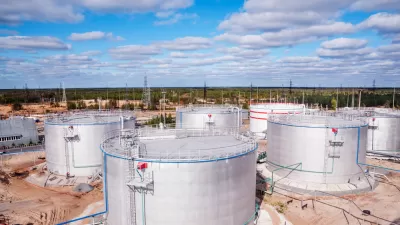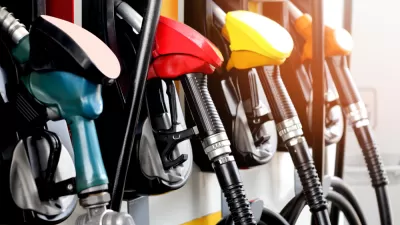Gas prices have risen dramatically and continue to rise, with oil topping $110 per barrel. How are we paying for it, and who benefits? The News Hour's Ray Suarez interviews oil expert Lisa Margonelli for answers.
Oil now tops $110 barrel – and there are dire consequences not readily apparent.
"Right now we're spending more than $1.2 billion a day on gasoline alone in the United States. And about five years ago, we were spending less than half that. So now we're spending $600 million or $700 million a day on getting no more than what we were getting in 2003."
"We're paying for it on credit cards. We're changing the way we shop at the grocery store, selecting cheaper products, yet we're barely taking our foot off the gas pedal."
So who benefits from the dramatic price increases?
"No very much of it goes to your local gas station, that's for sure. Those guys make about three cents a gallon."
Is the additional revenue benefiting the big oil producing countries?
The money has "contributed to kind of a cycle of corruption and poverty. It doesn't really grow a real economy...Recent studies have shown that in both Venezuela and Iran, people are feeling that they have kind of a falling standard of living, even after five years of dramatically rising oil prices."
"Worse yet, the price increases has led to a black market, where oil is stolen from pipelines, or even tankers themselves, and much of it goes to guns", leading to violence and instability.
[Editor's note: Written transcript, RealAudio, Download and streaming video available.]
FULL STORY: Tracking Oil's Journey From the Pipeline to the Pump

Maui's Vacation Rental Debate Turns Ugly
Verbal attacks, misinformation campaigns and fistfights plague a high-stakes debate to convert thousands of vacation rentals into long-term housing.

Planetizen Federal Action Tracker
A weekly monitor of how Trump’s orders and actions are impacting planners and planning in America.

In Urban Planning, AI Prompting Could be the New Design Thinking
Creativity has long been key to great urban design. What if we see AI as our new creative partner?

King County Supportive Housing Program Offers Hope for Unhoused Residents
The county is taking a ‘Housing First’ approach that prioritizes getting people into housing, then offering wraparound supportive services.

Researchers Use AI to Get Clearer Picture of US Housing
Analysts are using artificial intelligence to supercharge their research by allowing them to comb through data faster. Though these AI tools can be error prone, they save time and housing researchers are optimistic about the future.

Making Shared Micromobility More Inclusive
Cities and shared mobility system operators can do more to include people with disabilities in planning and operations, per a new report.
Urban Design for Planners 1: Software Tools
This six-course series explores essential urban design concepts using open source software and equips planners with the tools they need to participate fully in the urban design process.
Planning for Universal Design
Learn the tools for implementing Universal Design in planning regulations.
planning NEXT
Appalachian Highlands Housing Partners
Mpact (founded as Rail~Volution)
City of Camden Redevelopment Agency
City of Astoria
City of Portland
City of Laramie





























